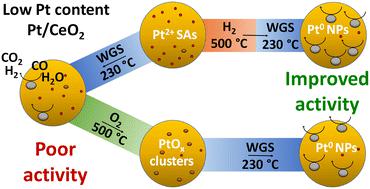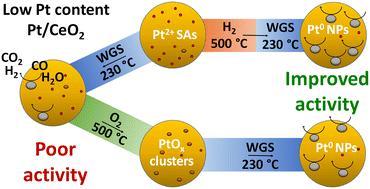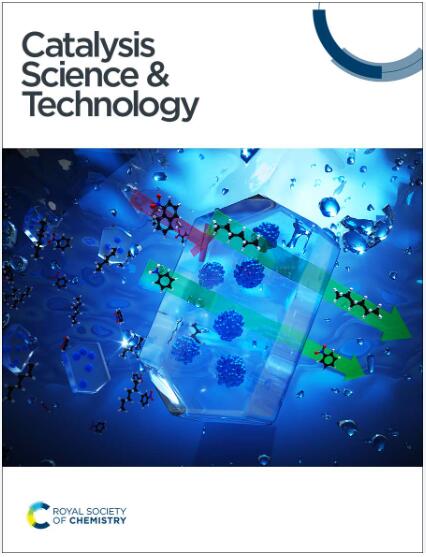氧化还原处理对 Pt/CeO2 催化剂上的低温水气变换反应的影响
IF 4.2
3区 化学
Q2 CHEMISTRY, PHYSICAL
引用次数: 0
摘要
Pt/CeO2 催化剂有望用于低温水煤气变换(LT-WGS)反应,这是利用合成气制取 H2 的重要步骤。通过铂盐浸渍和 500 °C 煅烧制备的铂/CeO2 催化剂含有 Pt2+ 单原子(SAs)和/或 PtOx 团簇,需要将其转化为 Pt0 纳米颗粒(NPs),以获得更高的 LT-WGS 反应活性。这项研究表明,在 250 °C、H2 条件下进行还原预处理,可增加在 230 °C反应过程中形成的 Pt0 NPs 的数量,从而提高含 0.10 至 1.06 wt% Pt 的催化剂的摩尔活性。在 500 °C 下进行预处理也能提高催化剂的活性,但仅适用于低铂含量的催化剂,这说明了预处理温度的重要性。此外,研究还表明,所有制备的铂/CeO2 催化剂在反应过程中都会慢慢失活,但只需在 230 ℃ 下进行氧化后处理即可再生,这在工业上很有意义。更具独创性的是,在 500 °C 下进行 12 小时的氧化后处理后,低铂含量催化剂的活性得到了显著提高。实验证明,这种处理方式能使铂原子重新分散并氧化成不同于初始铂原子的氧化铂。这些物种在 CeO2 表面具有高度还原性,很容易转化为活性 Pt0 NPs。本文章由计算机程序翻译,如有差异,请以英文原文为准。


Influence of redox treatments on the low-temperature water gas shift reaction over Pt/CeO2 catalysts†
Pt/CeO2 catalysts are promising for the low-temperature water gas shift (LT-WGS) reaction, which is an important step to produce H2 from syngas. When prepared by impregnation of platinum salt and calcination at 500 °C, they contain Pt2+ single atoms (SAs) and/or PtOx clusters which need to be converted into Pt0 nanoparticles (NPs) to obtain higher activity for the LT-WGS reaction. In this work, it was shown that reducing pretreatments at 250 °C under H2 promote the molar activity of catalysts containing from 0.10 to 1.06 wt% Pt by increasing the number of Pt0 NPs formed during reaction at 230 °C. An improvement was also obtained via pretreatment at 500 °C but only for low-Pt-content catalysts, underlying the importance of the pretreatment temperature. Furthermore, it was shown that all prepared Pt/CeO2 catalysts which slowly deactivate over reaction time can be regenerated by oxidative post-treatment at only 230 °C, which is industrially interesting. Even more original, a strong improvement in activity of the low-Pt-content catalysts was observed after a 12 h oxidative post-treatment at 500 °C. This treatment was shown to redisperse and reoxidize Pt atoms into PtOx species different from the initial ones. Such species are highly reducible on the surface of CeO2 and easily transformed into active Pt0 NPs.
求助全文
通过发布文献求助,成功后即可免费获取论文全文。
去求助
来源期刊

Catalysis Science & Technology
CHEMISTRY, PHYSICAL-
CiteScore
8.70
自引率
6.00%
发文量
587
审稿时长
1.5 months
期刊介绍:
A multidisciplinary journal focusing on cutting edge research across all fundamental science and technological aspects of catalysis.
Editor-in-chief: Bert Weckhuysen
Impact factor: 5.0
Time to first decision (peer reviewed only): 31 days
 求助内容:
求助内容: 应助结果提醒方式:
应助结果提醒方式:


